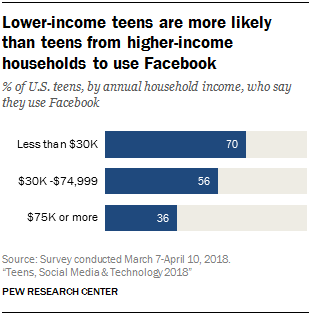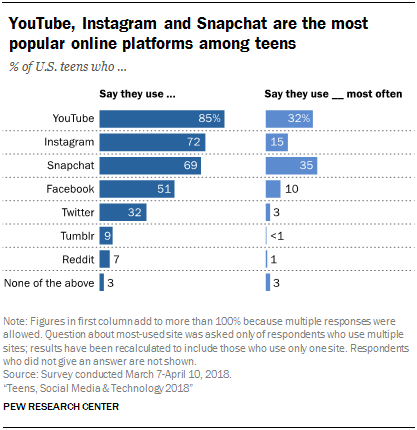Technology Research:Teens and Social Media
Did you know that teenagers using Facebook probably means that they are more than likely to be low-income?! I did not know this either, but according to the Pew Research Center (2018) teens who use Facebook as their main form of social media are more likely living in a household with an income less than $35,000/year. Generation X and millennials have used Facebook evenly regularly regardless of their income therefore I found teen usage and income connection very surprising. Teens in households with incomes over $75,000/year are more likely to use Snapchat, Instagram and YouTube as their main forms of social media.

Image Source: Pew Research Center
This research went more in detail and found that female teens are more than likely to use Snapchat as their main form of social media whereas boys are more than likely to use YouTube as their form of social media. Social Media for teens also do not revolve around one application as it did a few years ago. I remember when Facebook first came out it was the most popular site because we were not given as many social media applications as we have today. I myself hardly use Facebook because I use Snapchat and Instagram as my main form of social media because I find them more appealing. Even reading this article I realize that the report is outdated as it does not mention TikTok as a form of social media which is what teens are using the most today. All pre-teens and teens that I talk to are more comfortable using TikTok than any other social media because they are short videos. TikTok has even brought back music from other decades back as kids are hearing them for the first time in their lives. Social Media has a huge affect on culture and even in politics, so of course it will have an effect on our teens.

Image Source: Pew Research Center
Smartphones have also become a necessity among teens as 95percent of them own smartphones but only 88 percent of teens own a computer at home. The percentage of teens who are constantly connected to the internet has also increased to 45 percent, compared to the 24 percent from 2015 who said the same. I feel that this percentage has actually increased since remote learning has occurred. When discussing teens and social media it is almost impossible to not talk about the impact it causes their lives. Social media almost always gets a negative outlook when it comes to teens using it because of bullying and self esteem issues. According to this study only 24 percent of teens believe that social media causes a negative effect like bullying and depression etc. An astonishing 45 percent of teenagers believe that social media has neither a positive or negative effect on them. This information is surprising as there are many studies that show that social media has a negative effect on most people regardless of the age.
In 2018, only 45 percent of teens were constantly connected to the internet, now it's 2020 and there is a global pandemic that has pushed teens to be 100 percent connected to the internet. Not only do teens go online to be on social media but now they have to go online daily to "go to" school since most school districts in the country have gone remote. Now that teens only socialize with their peers on social media it is harder to determine the effect it will have on them in the next year or so. Many teens were already suffering from mental illnesses before the pandemic and having to be online all day, it is more than likely that even more teens will suffer some type of mental illness after the pandemic. As teachers we were able to help students who showed signs of mental distress like depression or isolation but now that everything is remote it is very hard for teachers to see these signs.
As a teacher I am worried about the effects that being online 100 percent of the time will have on students. Social media has positive and negative effects on all people of all ages but teenagers at this age are still trying to determine who they are and how to be themselves without having to worry about what others on social media think of them. I'm sure there will be many studies on the effects of the pandemic on students and I hope that the trauma caused by the pandemic is not long lasting.
RESOURCES:
Teens Growing Up with more Anxiety and Less Self-Esteem

Hi July,
ReplyDeleteI really enjoyed reading your post. I was completely shocked reading that Facebook use in teens was linked to low income. I wonder if this is because it also has an easy to navigate computer interface, while Instagram and Snapchat are more geared towards smartphones, and low income teens could use public computers to access Facebook? I liked the bit about gender difference. I have even noticed this beyond the teen years, within my own friend group.
I am also concerned about the amount teens use the internet these days. Even prior to the pandemic I was really struggling to accept that so many of my students (under the age of 13) were active on social media daily. Now, between remote learning, social media, and video games, I feel that students are getting way too much screen time and it is negatively impacting both their physical and mental health.
July I loved the thoroughness of your reflection! You are correct in that the next set of survey data will no doubt show the influence of Tik Tok on Gen Z!
ReplyDeleteHi July,
ReplyDeleteI didn't know there was a correlation between social media use and family income among teens. I wonder why that is? I didn't think any teens (or at least a very small percentage) use Facebook at all. Personally, my 14 year old son is on SnapChat, Instagram and YouTube. He says Facebook is for older people like me. My 17 year old son doesn't really use social media apps. He plays games on Discord and is able to talk to friends (usually from different countries) that way.
Hi July,
ReplyDeleteThanks for sharing! It was surprising to read that while most teens use social media, a small amount of them see it having a negative impact. That is definitely a good sign although there is still much work to do against cyber bullying. I don't think there is a correct way to have school during this pandemic. I see both sides to being remote and in person. Many students may not feel comfortable at home and this entire situation may be taking a heavy mental toll on them. Once we return back to normal, I think we need to evaluate our students not only academically, but see how they were mentally impacted by this.